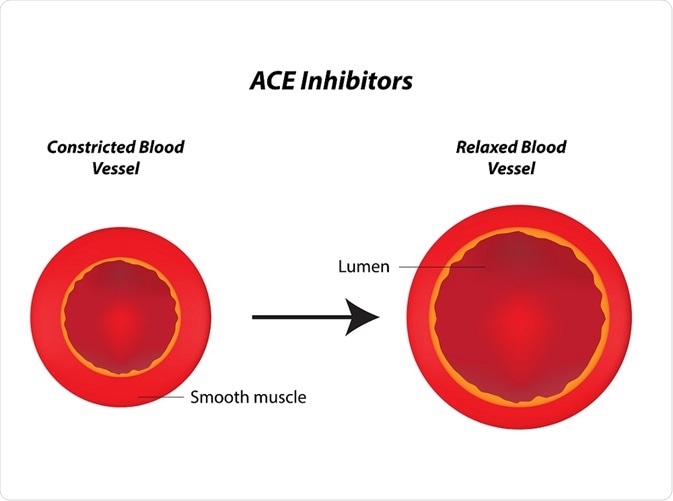RAAS is a complex system responsible for regulating the bodys blood pressure. This narrowing can cause high blood pressure and forces the heart to work harder.

Sbar Explained In Detail Caregiverology Nurse Study Notes Nursing School Notes Nursing Information
ACE inhibitors counteract or inhibit all of the pharmacological effects of angiotensin-2 so they cause vasodilation decrease aldosterone levels Na fluid wasting K retention.

. Failure to convert angiotensin I to angiotensin II results in relative vasodilation as angiotensin II is a potent vasoconstrictor. Therefore it is very important the nurse teaches the patient to limit foods high in potassium. How ACE Inhibitors Work.
If you believe that this Physiopedia article is the primary source for the information you are refering to you can use the button below to access a. When blood flow to the kidneys is reduceda common occurrence in heart failure in which the heart isnt. Correct answer C.
This activity reviews the indications contraindications activity adverse events and other key elements of. Inhibit the conversion of angiotensin-1 to its more active from angiotensin-2. Most cases are primary and not attributable to any specific etiology.
ACE inhibitors prevent an enzyme in the body from producing angiotensin II a substance that narrows blood vessels. Physiopedia articles are best used to find the original sources of information see the references list at the bottom of the article. ACE inhibitors and ARBs can suppress the production.
Heart failure is a progressive process during which the heart undergoes major changes. Her past medical history is significant for. The kidneys release.
Angiotensin-converting enzyme ACE inhibitors such as captopril Capoten and enalapril Vasotec decrease peripheral vascular resistance and. ACE inhibitors reduce preload. The RAAS is a chain of enzymes that work together to regulate blood pressure and the concentration of sodium in the blood.
By decreasing cardiac remodeling. Angiotensin-converting enzyme ACE inhibitors are medications that help relax the veins and arteries to lower blood pressure. ACE inhibitors work by interfering with the bodys renin-angiotensin-aldosterone system RAAS.
NUR 600 Module 3. 59The correct answer is Reduction of blood pressure through reduction in blood volume. ACE inhibitors are competitive inhibitors of ACE which prevent the conversion of angiotensin I to angiotensin II.
Angiotensin Converting Enzyme Inhibitors ACE-I prevent the conversion of angiotensin I to angiotensin II which disrupts the renin-angiotensin-aldosterone system RAAS. ACE inhibitors produce major reductions in sympathetic nerve activity and plasma levels of catecholamines. ACE inhibitors decrease vascular resistance decrease preload decrease afterload and increase cardiac output.
Mechanism of action Angiotensin Converting Enzyme Inhibitors ACE-I prevent the conversion of angiotensin I to angiotensin II which disrupts the renin-angiotensin-aldosterone system RAAS. ACE inhibitors seem to correct the insulin resistance of hypertensive patients but this effect also appears to be class related more than limited to one ACE inhibitor or another. Briefly describe the therapeutic actions of drugs affecting blood pressure diuretics ACE inhibitors ARBs CCB sympathetic nervous system drugs.
How do B-blockers improve cardiac function in HF. ACE inhibitors are also used to improve survival after heart attacks. What is the mechanism of action for ACE inhibitors.
ACE inhibitor inhibits the angiotensin converting enzymeACE. Which best describes the action of ACE inhibitors on the failing heart. The answer is B.
January 24 2022 by Best Writer. Angiotensin II acts as a potent vasoconstrictor that when inhibited can reduce blood pressure by dilating vessels and decreasing aldosterone secretion. If monotherapy is appropriate in a patient with hypertension and osteoporosis thiazide-like diuretics may have advantages over ACE inhibitors ARBs and calcium.
ACE Inhibitors and spironolactone its a potassium-sparing diuretic will both cause the kidneys to retain potassium. Angiotensin-converting-enzyme inhibitors ACE inhibitors are a class of medication used primarily for the treatment of high blood pressure and heart failure. 1 2 They work by causing relaxation of blood vessels as well as a decrease in blood volume which leads to lower blood pressure and decreased oxygen demand from the heart.
Failure to convert angiotensin I to angiotensin II results in relative vasodilation as angiotensin II is a potent vasoconstrictor. The effect of angiotensin-converting enzyme ACE inhibitors on renal function in the hypertensive patient is related both to the glomerular actions of angiotensin II and to the mechanism of autoregulation of the glomerular filtration rate GFR 1. A patient is taking an ACE Inhibitor and Spironolactone.
ACE inhibitors angiotensin converting enzyme inhibitors and ARBs angiotensin-receptor blockers are used to treat high blood pressure hypertension and congestive heart failure to prevent kidney failure in patients with high blood pressure or diabetes and to reduce the risk of stroke. Angiotensin II constricts both the afferent and efferent arterioles but preferentially increases efferent. For example the patient with asymptomatic left ventricular dysfunction early post-infarction will probably have only relatively minor chamber enlargement.
ACE helps in conversion of angiotensin 1 to angiotensin2 angiotensin2 is a vaso View the full answer. ACE inhibitors are medications used to treat and manage hypertension which is a significant risk factor for coronary disease heart failure stroke and a host of other cardiovascular conditions. BC is a 70-year-old female who is diagnosed with HFrEF.
Our knowledge of this field is still limited and more studies are necessary especially to understand the prognostic impact of insulin resistance andor insulin resistance improvementABSTRACT TRUNCATED. ACE inhibitors block a key enzyme in the renin-angiotensin-aldosterone system RAAS. Discussion 3 _____ The advanced practice nurse is updating the plan of care of nursing home patients with hypertension.
Low blood pressure occurs - Kidneys release RENIN into circulation - causes ANGIOTENSINOGEN a protein created and released by the liver to produce ANGIOTENSIN I - then a substance called ANGIOTENSIN - CONVERTING ENZYME ACE converts Angiotensin I to - ANGIOTENSIN II ACE Inhibitors prevent the conversion of Angiotensin I to Angiotensin II.

Ace Inhibitors Mechanism Of Action Side Effects And Precautions

Ace Inhibitors Mechanism Of Action Side Effects And Precautions

Cv Pharmacology Angiotensin Converting Enzyme Ace Inhibitors
0 Comments